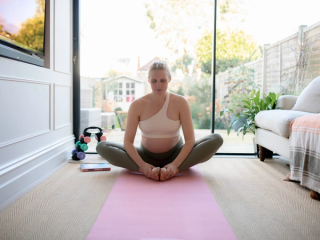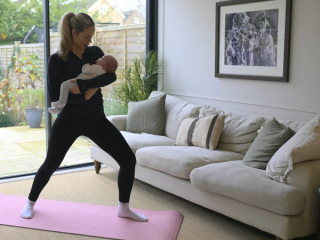
- Home
- Advice Hub
- Newborn
- Postnatal Care
- Sex After Birth
Sex after birth: how long should you wait?
Learn when it's safe to have sex after childbirth, recovery tips, and what to expect emotionally and physically.

Can sex be painful after pregnancy?
Thinking about postpartum sex can be daunting, your body has been through a lot of change. The idea of being intimate can raise a lot of questions. You won’t be surprised to hear sex after birth can be uncomfortable. If you had a vaginal birth, stitches from tears or an episiotomy may cause some tenderness. Your body is also affected by lots of hormonal changes, even more so if you are breastfeeding and these can lead to vaginal dryness. The positive is the discomfort is usually temporary and as you move through the healing process things will soon get back to normal. Allow yourself as much time as you need for perineal healing.
Preparing yourself for sex
Advice from our Relationship Expert, Elinor!
Communicate, communicate, communicate
"It might feel like you and your partner share a lot of the parenting duties, or you might be doing a lot of things by yourself. Either way, you will have both had quite different experiences, and talking to each other is going to be really important to help you each gain understanding and empathy for the other.
If you’ve been the one recovering from birth, perhaps you can share your worries about sex and what you might need to feel less anxious. If you are the non-birth partner, then you might have a different relationship with your partner’s body compared to previously, and you might be anxious about causing pain or discomfort. The more the two of you can talk about any worries you have before you even start being sexual again, the more chance there is that future sexual experiences will be positive."
Tiny touches
"If it’s been a while since you had sex, then expecting yourself to go from 0-60 isn’t always realistic. Instead, start to think about building up to sex through tiny touches. This is all about breaking down the physical barrier between the two of you, so you start to feel closer and more intimate.
Tiny touches could include sitting close to each other on the sofa, holding hands when you walk, or stroking your partners back when you pass each other in the kitchen. See if you can find 5 small ways to touch your partner each day without them noticing what you’re doing. By playing this game with each other, you are making some intention effort to connect which can be very meaningful in the longer term."
Focusing on sensations
"Prior to kids, you might have had a very adventurous sex life, or maybe you liked the same sort of sex every time. Maybe you knew exactly what you and your partner liked. However, it might be a good opportunity now to press the reset button together and learn to explore each other’s bodies again.
Try Sensate Focus exercises, which aim to reduce anxiety by encouraging couples to focus on sensation and touch rather than a particular goal. Agree on any no-go zones first, if you’re not ready to have your breasts, stomach or genitals touched.
Starting slowly, just focus on touching each other with your fingers, just stroking and caressing each other for 5 minutes each and noticing the sensations of touching or being touched: is your partner’s skin warm, firm, soft, dry, smooth, or cool? Once your 10 minutes of touching time is up, have a big hug and cuddle up under a rug or duvet together. This is great way to reconnect with touch and intimacy, without pressure and expectation."
You don’t have to go ‘all the way’
"We often feel that penetrative sex is the only ‘real’ sex but postnatally it can be important to only have penetrative sex when you’re ready to, especially if you’ve had a traumatic birth or required stitches. There are lots of different ways to enjoy pleasure and connection together, so building trust through sexual play first can be important before you feel ready to have penetration again.
You may wish to explore penetration when you’re by yourself at first, for instance in the bath, so that you can safely get to know your body and what does, and doesn’t, feel good. When you do feel ready to have sex, you will then be in a better position to guide your partner towards what works best for you."
Lube!
"If you are producing milk, then your body is in a hormonal state similar to peri menopause. The low oestrogen levels can cause vaginal dryness, meaning your vagina’s natural lubrication system is turned down. A lack of lubrication can cause friction, which is painful. To counter this, we want to get arousal levels high, so lots of foreplay before anything enters.
We can also get a helping hand from lube in a bottle, just remember to go water based if relying on condoms for contraception, as many women are still fertile even when breastfeeding and oil-based lubricants can affect condom effectiveness. Make sure you choose a non-scented version to avoid the risk of irritating your sensitive parts."
When can I have sex after a c-section?
Whilst there is no exact amount of time given to wait to have sex after a c-section, it is important to remember a c- section is a major surgery. It is strongly recommended you should always consult with your healthcare provider to ensure you’re physically and emotionally prepared before resuming sexual activity.
You may have soreness and swelling around the incision site whilst it heals, so it is best to avoid strenuous physical activity. Getting the okay at your 6 week check up is a good starting point, but remember everybody is different and you must do what feels right and good for you, even if this goes beyond the 6 weeks.
Am I more fertile in the first year of giving birth?
Fertility depends on many different factors, such as ovulation patterns, hormonal changes and breastfeeding, all of these are complex and difficult to predict after pregnancy, as our body has been through so much change. It is important to know that you can get pregnant as little as 3 weeks after you have given birth and if you do not want to get pregnant again then you must use contraception every time you have sex.
Give yourself plenty of time to recover emotionally and physically before getting pregnant again. Ensuring you are at your best health overall before another pregnancy will increase your odds of everything going smoothly.
How can I prevent getting pregnant straight after giving birth?
To prevent a pregnancy after giving birth, it is important to use contraception. You may not want to go back to the same contraceptive method you were using before you had your most recent pregnancy. This is completely fine and educating yourself regarding all the contraception available to you will help you make an informed decision which is best for you. Making an appointment with your GP and discussing this is a great way to take the steps to protect yourself.
Will my partner’s sex drive change after birth?
Sex drive is influenced by lots of different factors and can change over different phases of your relationship. Whilst some partners feel a deeper sense of connection after they have had a baby together, it is also normal to find adjusting to life with a newborn baby stressful and exhausting, which in turn can change our desire to have sex.
Having a baby reduces the amount of quality time we previously spent with our partners which can also impact on intimate relationships. Remember you are on a journey of change and navigating new normal together. The important thing is to keep talking and communicating with your partner and express how you are both feeling in honest conversations.












